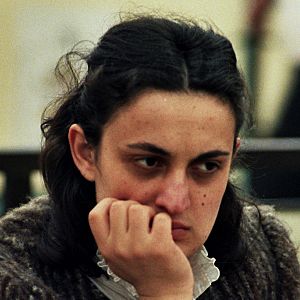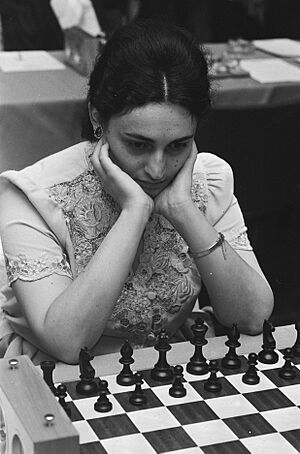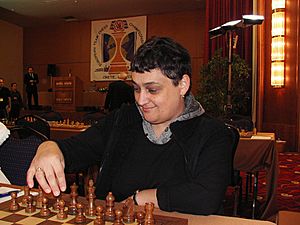Maia Chiburdanidze facts for kids
Quick facts for kids Maia Chiburdanidzeმაია ჩიბურდანიძე |
|
|---|---|

Maia Chiburdanidze, Thessaloniki 1984
|
|
| Country | Soviet Union → Georgia |
| Born | 17 January 1961 Kutaisi, Georgian SSR, Soviet Union |
| Title | Grandmaster (1984) |
| Women's World Champion | 1978–1991 |
| FIDE rating | 2500 (August 2025) [inactive] |
| Peak rating | 2560 (January 1988) |
| Peak ranking | No. 48 (January 1988) |
Maia Chiburdanidze (Georgian: მაია ჩიბურდანიძე; born 17 January 1961) is a famous chess player from Georgia. She was the sixth Women's World Chess Champion, holding the title for 13 years, from 1978 to 1991. For a long time, she was the youngest champion ever, until Hou Yifan broke her record in 2010. In 1984, Maia became the second woman in history to earn the highest chess title, Grandmaster, from FIDE (the World Chess Federation). She also helped her teams win nine gold medals at the Women's Chess Olympiad, a big international chess competition.
Contents
Early Life and Chess Beginnings
Maia Chiburdanidze was born in Kutaisi, a city in what was then the Soviet Union. She started playing chess when she was about eight years old. By 1976, she had become the champion for girls in the USSR. Just one year later, she won the women's national title. In 1977, FIDE gave Chiburdanidze the title of Woman Grandmaster.
Early Tournament Success
Maia showed her talent early on. She won her first international tournament in Braşov in 1974, when she was only 13. She then won another tournament in Tbilisi in 1975. These wins helped her qualify for the Women's World Championship cycle in 1976 and 1977.
Her Chess Style
Maia Chiburdanidze played chess in a strong and aggressive way. Her style was based on classic chess ideas. Her coach, Eduard Gufeld, a top Soviet trainer, helped her develop this style when she was young.
Becoming World Champion
Maia Chiburdanidze came in second at the Tbilisi Women's Interzonal tournament in 1976. This meant she could compete in the 1977 Candidates matches. She won her way through these matches, beating Alla Kushnir by a score of 7½–6½ in the final. This victory set up a match for the world title.
The Championship Match
In 1978, Maia played against the reigning Women's World Champion, Nona Gaprindashvili. The match took place in Pitsunda, Georgia. Chiburdanidze defeated Gaprindashvili with a score of 8½–6½, becoming the new World Champion.
Defending Her Title
Maia successfully defended her world title four times.
- In 1981, she kept her title by drawing 8–8 with Nana Alexandria in Borjomi and Tbilisi.
- Three years later, in 1984, she played Irina Levitina in Volgograd, Russia, and won 8½–5½.
- Her next defense was against Elena Akhmilovskaya in Sofia in 1986, which Maia won 8½–5½.
- In 1988, she beat Nana Ioseliani in Telavi, Georgia, by 8½–7½.
In 1984, FIDE gave Chiburdanidze the title of Grandmaster. She was only the second woman, after Nona Gaprindashvili, to receive this high honor.
Losing the World Title
In February 1991, Xie Jun from China earned the right to challenge Maia for the world championship. Chiburdanidze lost her title to the young Chinese player in Manila by a score of 8½–6½. Her reign as champion lasted 13 years. This was the third longest reign for a women's champion. Only Vera Menchik (17 years) and Nona Gaprindashvili (16 years) held the title longer.
Attempts to Regain the Title
After losing her title, Chiburdanidze tried to win it back. However, new strong players from China and the talented Polgár sisters made it very difficult. Her best result since 1991 was winning the Candidates tournament in Tilburg in 1994. But she lost the playoff match to Zsuzsa Polgár by 5½–1½.
Even though she did not like the knockout format for the world championships, she still competed in them. She reached the semi-finals in 2001, but lost to Zhu Chen of China, who went on to win the title. In 2004, Chiburdanidze again made it to the semi-finals. She lost to Antoaneta Stefanova, who then became the champion.
Other Chess Achievements
Maia Chiburdanidze believes that there should not be separate tournaments for men and women in chess. She has played in many "men's" tournaments around the world. Her best performances were in the 1980s and early 1990s.
- She won tournaments in New Delhi (1984) and Banja Luka (1985).
- She finished third in Bilbao (1987) against top players.
- In the 1990s, she won tournaments in Belgrade (1992), Vienna (1993), and Lippstadt (1995, 1996, 1997).
Maia Chiburdanidze was the first woman to win an elite round-robin tournament, achieving this twice in the mid-1980s.
Team Success
She was a very important player for the USSR team that won many Women's Olympiads in the 1980s. When Georgia became an independent country in 1990, she played on the top board for the new Georgian national team. This team won four gold medals at the Olympiads in 1992, 1994, 1996, and 2008.
She also played in the European Team Championships in 1997, where Georgia won the gold medal. In 2001, she played in the 1st Europe vs. Asia Intercontinental rapidplay match in Batumi, Georgia. Asia won the women's section, and Maia scored 3½ points. At the 2008 Dresden Olympiad, she played on board 1 for Georgia, helping them win the gold medal. She also won a personal gold medal for her excellent performance. As of 2025, she has not played in competitive chess since July 2012.
Honors and Recognition
Maia Chiburdanidze has received many honors from her home country. Several postage stamps have been created to celebrate her achievements in chess. Mongolia even issued a special stamp in 1986 that showed a position from one of her games in the 1984 world championship match. In 2014, she was added to the World Chess Hall of Fame.
In 2021, Chiburdanidze appeared in a documentary called Glory to the Queen. This film also featured other famous Georgian chess players like Nana Alexandria, Nona Gaprindashvili, and Nana Ioseliani.
See also
 In Spanish: Maia Chiburdanidze para niños
In Spanish: Maia Chiburdanidze para niños



